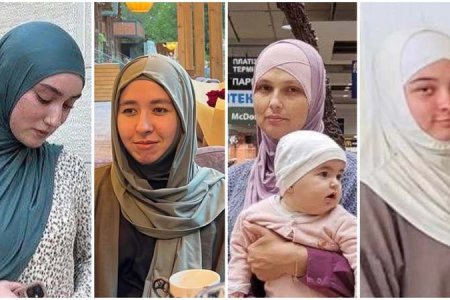
Lawyer Emil Kurbedinov has lodged a formal complaint over the Crimean FSB press service’s active circulation of outrageous lies about the four Crimean Tatar women seized in Russia’s new escalation of terror in occupied Crimea. A mother of five and three very young women were described, without any evidence at all, as ‘members of a terrorist cell’, with all state-controlled Russian media copy-pasting these baseless assertions. This is not just a flagrant infringement of the presumption of innocence, but active complicity in fabricating totally unwarranted ‘terrorism’ charges.
Despite titles like ‘FSB breaks up a terrorist cells’, the armed raids in the early hours of 15 October 2025 targeted devout Muslims, not ‘terrorists’, with the ‘searches’ openly looking only for ‘prohibited religious literature’. While these are conveyor-belt prosecutions, used particularly against civic journalists and activists of the Crimean Solidarity human rights movement, there was an ominous difference on 15 October, with this the first time that Russia had targeted Crimean Tatar women. Esma Nimetulayeva (b. 1985) is the wife of political prisoner Remzi Nimetulayev whose arrest left her the sole carer for their five children. The FSB who burst into the family’s home on 15 October told Esma’s 73-year-old mother to adopt the children, or they would be placed in care. The FSB also came for three young women: Fevziye Osmanova (b. 2004) and two students Elviza Alieva (b. 2005); and Nasiba Saidova (b. 2006) who turned 19 shortly after her arrest. All are accused solely of unproven involvement in Hizb ut-Tahrir, a peaceful, albeit controversial, transnational Muslim organization which is legal in Ukraine. The Russian supreme court’s outlawing of Hizb ut-Tahrir as ‘terrorist’ in 2003 was never explained and was kept secret until it was too late to lodge an appeal. That ruling, however, is used as sole justification for ‘terrorism’ charges and huge sentences. No proof of actual involvement in Hizb ut-Tahrir is needed, with Russia using planted ‘prohibited literature’; FSB-loyal ‘experts’ and ‘anonymous witnesses’ who may have never set eyes on the defendants. There is also the considerable role played by the FSB press service and Russian propaganda media.
In his complaint over the actions of the press service, Kurbedinov, who is representing Esma Nimetulayeva, demands that a fact check be carried out and that the FSB press service publish a retraction of the allegations. He says that, if he and his client do not receive a response, they will consider bringing libel charges.
Kurbedinov and other lawyers, representing those accused of such charges, have repeatedly pointed out that these prosecutions are in breach of Russia’s own legislation. As he explained to Crimean Solidarity, the press service’s claims about the women create a negative impression about their supposed involvement in an organization deemed terrorist in accordance with current legislation, and about their purported “involvement in terrorist activities”. This is despite the fact that Russia’s federal law ‘On countering terrorism’, adopted in 2006, states clearly that terrorist activities and terrorist acts are exclusively violent actions against society and the state. The 2003 supreme court ruling declared Hizb ut-Tahrir ‘terrorist’ on the basis of legislation that, in 2006, ceased to have legal force. The new legislation clearly stipulated the requirements for something to be considered terrorist activities. Hizb ut-Tahrir has never been declared terrorist in accordance with current legislation, removing any grounds for these ‘trials’ and horrific sentences.
The arguments are compelling but will almost certainly be ignored. The FSB are known to get promotion or bonuses from such conveyor-belt prosecutions, and Russia is using them as a weapon to crush Crimean Solidarity and as a method of intimidation of the Crimean Tatar community. All of the ‘FSB officers; ‘anonymous witnesses’; fake experts; prosecutors and ‘judges’ involved in these ‘trials’ are well aware that they are sentencing people who have committed no crime to huge terms of imprisonment on the basis of a cynical lie. The same is true of the FSB Press Service.
Four women are now in detention, with very long sentences essentially guaranteed. The reality is very different. Esma Nimetulayeva (b. 9 January 1986) is a confectioner who had, since August 2023, been the sole parent bringing up her and political prisoner Remzi Nimetulayev’s five daughters, all of whom are under 18.
Elviza Alieva (b. 29 May 2005) is a fourth-year student at the occupation Vernadsky federal university, specializing in management. She has also been working as a sales assistant in a Simferopol bakery.
Fevziye Osmanova (b. 24 May 2004) is from Orlivka, just outside Sevastopol and works in a local shop.
Nasiba Saidova, who was born on 25 October 2026, is the youngest victim of Russia’s Crimean conveyor-belt ‘Hizb ut-Tahrir trials’. She is from Bakhchysarai region and the daughter of a well-known Imam. She herself is studying at a teacher-training college and also works at a nursery. The armed raid, that ended with her being taken away, began at 5 a.m. with both Nasiba’s husband and his father, Seit Saidov, forced to the ground and treated very roughly.
Esma Nimetullayeva has been charged with ‘organizing’ a supposed Hizb ut-Tahrir group under Article 205.5 § 1 of Russia’s criminal code. The others are accused of ‘involvement’ in such a fictitious ‘group’ (Article 205.5 § 2). It remains to be seen whether the women are also charged, as has become standard against Crimean men in such cases, with ‘planning to violently seize power’, under Article 278.


